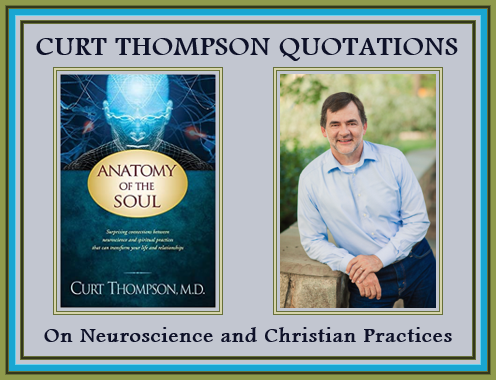Curt Thompson Quotations – On Neuroscience and Christian Practices
Quotations are taken from:
Curt Thompson MD, Anatomy of the Soul: Surprising Connections between Neuroscience and Spiritual Practices That Can Transform Your Life and Relationships, Tyndale Momentum, June 1, 2010.
***
Transformation – Beyond “Belief”
261 - Often we judge whether someone is a Christian based mostly on what that person “believes” – In other words, logical, linear, literal thought processes about perceived propositional truth. To prove they are Christians, people need only reel off a few sentences reflective of left-mode mental processing. But this is not the same as being a Christian, which demands the full integration of right-mode operation along with cognitive, factual expressions of faith.
16 - Despite the interest in spirituality in much of the West, and North America in particular, our overall experience of God’s power and life-giving vitality is often limited – especially when it comes to growth and reconciliation in our relationships. We often see life in Jesus as being more about survival in this life until we “die and go to heaven” than about grace, adventure, and genuine, concrete, life-giving change.
26 – What if you had a set of tools, drawn from recent discoveries about the brain, our relationships, and how they shape one another, to assist you in the ways of being known? What if the Holy Spirit were wielding these tools as a means to invite you into a life of grace and adventure?
Mentalization (“Theory of Mind”)
116 – Not surprisingly, adults with secure attachments are generally more empathic than others. empathy is not something people are “born with.” Rather, they develop this quality through what researchers call mentalizing, or mentalization – the imaginative mental activity that enables us to sense and interpret the feelings, desires, and intentions of another person. [* Another technical term for this capacity is “Theory of Mind”]
118 – The degree to which a child learns to mentalize in a healthy manner is directly related to the competence of the child’s parent to mentalize in the first place. If a parent does not read his or her infant in an attuned manner and respond with wisdom to the baby’s needs, the child will develop distorted methods of signaling his or her own needs and intentions to others. for this reason, mentalizing is a major force that influences the attachment process and shapes its outcome.
Ancient Spiritual Practices Parallel Neuroscientific Discoveries
180 – Spiritual disciplines have been practiced in the lives of deeply integrated followers of God for over three thousand years. Interestingly, they can facilitate the very things neuroscience and attachment research suggest are reflections of healthy mental states and secure attachment. Furthermore, these disciplines can strengthen the nine functions of the prefrontal cortex. / In short, the disciplines enable us to pay attention to the Spirit who is speaking to us through that very medium. Jesus’ mind, I suggest, reflects the most integrated prefrontal cortex of any human of any time.
Sin Understood / Learning to Reverse Disintegration
184 – From a neuroscience perspective sin is deeply reflected in the degree to which our minds are dis-integrated, or in Paul’s language, depraved. In other words, what the language of neuroscience calls dis-integration offers a correlate to the scriptural language of sin.
Transformation
184 – Rom 12:1-2 – but be transformed by the renewing of your mind.
Love’s Power
246 – Cor 13:8 - Love never fails.
248 – Only love perfectly mentalizes.
Holy Spirit and Effortful Spiritual Practice
253 – There is nothing magic here. There is nothing contained within these pages that does not boil down to really hard work empowered by the Holy Spirit. (Whatever exactly that means, I admit. I really mean that. I believe that anything good that comes to pass on the earth is of God, energized by his Spirit, no matter the agent. However, trying to capture and delineate what constitutes the power of the Holy Spirit as opposed to my own volition, or understanding where I stop and the Spirit starts – or vice versa – is rather like, as folk-rock singer David Wilcox poetically describes it, trying to catch the wind in my fist. Not to mention an exercise that when pursued too intently becomes limited to a disconnecting left-mode pursuit that is isolated from the right mode of operation.)
Neurosplasticity as a Tool Built by God
48 – People’s anxiety over their finances or their singleness respond easily to Paul’s admonition to ”not be anxious about anything, but in every situation . . . present your requests to God” (Philippians 4:6). When we hear that, most of us become even more anxious because we’re not very good at not being anxious. But what happens when we begin to consider that we can change the way our brains are wired? Perhaps it can point us to what God is up to when he invites us to love him and give us hope that the tools he’s built inside each one of us can help us move toward lasting change.
***



Comments
Post a Comment